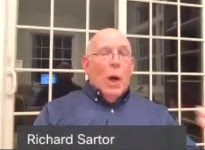Depends on who you ask
By Will Collette
 |
The Charlestown Citizens Alliance doesn't think
residents have a "right" to emergency medical service |
In the complex ballot Charlestown voters face this year, there are
11 proposals for changes to the Charlestown Town Charter. The Charter is
basically our town Constitution.
Charter questions are very much an “inside baseball” deal
that few other than local political junkies like me even bother to read. But
they do shape town policies for better or worse.
Fortunately, the town has published a non-partisan, unbiased
voter guide that not only lists the ballot questions but also shows how these changes
affect the Charter. You may already have a printed copy that was mailed to
every Charlestown household. If you have already pitched it, CLICK HERE to read it.
Four Charter questions – Questions 11,12, 13 and 16 – have
no known opposition and are largely procedural. Frankly, after a close review,
I didn’t see any problems with any of the 11 Charter proposals.
Then of course the Charlestown Citizens Alliance (CCA) weighs in, strongly opposed to five proposed Charter changes and calling two others “toss-ups,” though their tone is decidedly negative. They take a jaundiced view
toward any changes that might affect the CCA’s power.
Let’s look at the seven Charter questions the CCA finds
problematic. Their critique gives you some insight into how the CCA’s
principles play out in practice. Again, refer to the Town Guide to see the official
language and how the proposals affect the Charter.
Make emergency rescue service a basic town service
We begin with Question #14, an important change that would amend the Charter to guarantee the
town provides emergency medical services, either directly or through a vendor
such as the Charlestown Ambulance and Rescue Service.
The CCA wants you to vote NO. I find the CCA’s position to
be disgusting, especially after a year where Cathy and I have had the
benefit of Charlestown Rescue staff on multiple occasions. I commend all the
men and women who provide life-saving services, quickly, courteously and
professionally.They've saved the lives of hundreds of residents. An essential part of our community, they need the best state-of-the-art equipment and training. It's a smart investment for Charlestown voters to guarantee ambulance and rescue services under our Town Charter.
The CCA professes to not understand why this Charter change
is needed considering the recent 3-year contract the Charlestown Residents
United (CRU) Council leadership negotiated with Ambulance and Rescue.
Duh.
The Charter change would make emergency medical
services an essential town service like all other services codified in the Charter. Contracts
are a way to provide the services.
The Charter change protects citizens against future
Councils, such as a CCA-controlled Council, that might decide emergency medical
services are NOT essential. I strongly urge you to vote YES.
End mass turnover on the Town Council
The CCA opposes Question 7 that would change the terms of
office of Town Council members from the present two years to four with
staggered terms of two and three members per election cycle.
The case for this change is that it improves continuity on
the Council rather than the periodic spasms of mass turnover we’ve seen during
the CCA’s reign. Ironically, the CCA made exactly the same argument for the
election of Planning Commission members to six-year staggered terms. Yet, they
take the opposite position when it comes to the Town Council.
I am sick to death of the CCA’s two-faced contradictions and
suggest you vote YES to Question 7.
End the mandate for search committees
The CCA opposes Question 10 which would drop the requirement
for an appointment of a Search Committee when picking a new Town Administrator.
They say the Search Committee prevents cronyism, even though the search
committee is appointed by the Town Council.
In my view, ten years of having CCA toady Mark Stankiewicz
shows how Charlestown needs to re-stablish the principle that the Town
Administrator must be a professional public employee who works for the good of ALL
the people of Charlestown. Stankiewicz told me to my face that he “works for
the CCA” and serves at their pleasure. His terrible record shows just how true that is.
The town needs to do whatever is necessary to hire staff
that are dedicated to people, not politics. One of the best things the new
Charlestown Residents United (CRU) did at the beginning of its term is hiring
former Charlestown Chief of Police Jeff Allen as Town Administrator who has
been an effective, no-drama manager.
Further, the proposed Charter change does NOT prohibit the Council from appointing a Search Committee. The Council has used its discretion to appoint search committees in the past when it seemed like a good idea. Under this proposal, they still can. Vote YES on Question 10.
Put the Council and Planning Commission on the same election cycle
The CCA is really pissed about Question 15 that cuts the terms of
office for Planning Commission members from 6 years to 4 with staggered terms. On
Question 7 (above), the CCA also opposes a proposed change to town council
members’ terms of office that would also make town council terms 4 years in
length and staggered.
Having the Council and the Planning Commission on the same election
cycle strikes me as fair and simpler for the average voter to follow.
The CCA raises their concern that state approval
for such a change may take a long time. For some unspecified reason, in their
humble opinion, this might jeopardize the anomaly of Charlestown being the
only municipality in Rhode Island that still elects its planning body.
I don’t care. In my opinion, Charlestown SHOULD stop
electing the planning commission to take politics out of planning. Run by current
CCA Council candidate Ruth Platner, the Planning Commission has been weaponized
to torture small businesses and enforce exclusionary zoning.
Please vote YES to Question 15.
Allow service on more than one board or commission
The CCA thinks you should reject Question 17, which would allow
individuals to serve on more than one town board or commission. They say this
would limit opportunities for more citizens to serve on such boards.
Rubbish. For years, including during the CCA’s long reign,
Charlestown has been desperate to get more volunteers for everything ranging
from the Charlestown Fire District to said boards and commissions. Our
population is very small and becoming more elderly. Younger people must work
harder to make ends meet. Vacancies go unfilled.
The only times a commission or board gets more applicants
than it has vacancies are when
the CCA targets a commission for takeover and wants to pack it with their
loyalists. Examples go from A to Z, from the Affordable Housing Commission
to the Zoning Board.
This question simply expands the recruitment pool and
contains the safeguard that any such dual service must receive unanimous
Town Council approval.
Please vote YES on Question 17.
Let’s look at the two questions the CCA rates as
“toss-ups” though their language indicates their opposition.
Don't allow Council majorities to censor Council minority members
The CCA is conflicted about Question 8 regarding the conduct of the Town
Council because it says, “no rule may be implemented that prevents any
councilor from placing an item on an agenda for discussion and/or action to be
effective upon passage”.
The CCA says this would make town council meetings too long,
but that’s not the real reason they oppose. This Charter amendment proposal would end the undemocratic
CCA practice of blocking agenda items from non-CCA Council members.
For example, they refused
to put Deb Carney’s motion for an outside review of the CCA’s financial
screw-ups on the agenda. This wasn’t about meeting length – it was about
the CCA’s on-going cover-up of its financial management failures.
The CCA says Question 8 is a “toss-up.” I say it’s a
no-brainer. Please vote
YES.
Make posting town notices in print newspapers optional
Finally, the CCA has reservations about Question 9 to lift the requirement to publish town notices in a print newspaper. They say
this is essential to public transparency (as if this was still 1970) and a sign
of support for the struggling Westerly Sun.
I have a lifelong love of print newspapers. One of the best
things about the 25 years Cathy and I lived in Washington was reading the Washington
Post every day. The Westerly Sun has had some good days in the past – for example, the Sun’s
Dale Faulkner did a great job of covering the Copar quarry scandal.
But print newspapers have largely been bought up by
conglomerates who are bleeding them dry – dropping news staff, coverage,
editorials, features, raising prices and making themselves almost useless. The last time I checked, Progressive Charlestown had more Charlestown readers than the Sun.
Printing our ordinances in the Sun is not going to offset the predations of
vulture capitalists.
The Charter question doesn’t say we can’t continue to run
material in the Sun. It simply says we no longer must. Vote YES, please.
















